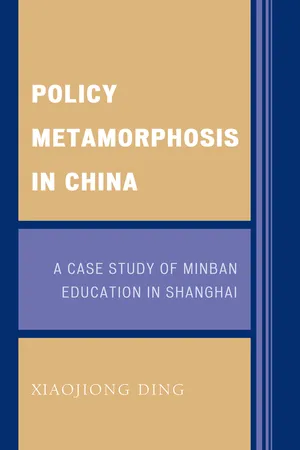
eBook - ePub
Policy Metamorphosis in China
A Case Study of Minban Education in Shanghai
- English
- ePUB (mobile friendly)
- Available on iOS & Android
eBook - ePub
About this book
China has been experiencing great economic and social changes since the late 1970s when the Reform and Opening-Up policies were accepted. While some Sinologists argue that such changes have made the Chinese structure of authority fragmented and discrepant, and have weakened the directive power of the Central Government, a few others emphasize that despite a certain degree of economic decentralization and segmentation of public power, the Central Government has been seeking ways to hold the nation together. Consequently, while the former argue that due to the centrifugal nature of the political system, policy implementation is bound to deviate from the route specified by the Central Government, the latter hold that national policies are carried out faithfully, with minor deviations only in certain circumstances.
This book studies the processes of policy implementation in contemporary mainland China by taking minban/private education at the level of basic education in Shanghai as an example. Based on 65 interviews conducted during 2001 and 2004, three moduses of policy implementation are proposed, and the Model of Structural Fracturation is advanced as the prevailing modus of policy implementation in contemporary China. The model argues that policy metamorphosis during implementation is not something random; in contrast, it is determined by structural factors that no single policy actor can manipulate. The pyramid of Chinese politics is a loose construction, with vertical and horizontal fracturations between different layers. The model highlights the fact that governments at the county/district level are remote from and beyond the control of the Central Government and the provinces. They deserve more attention than they have received.
Contrary to Western perspectives which regard the structural fracturation in the Chinese polity as dangerous for national stability and unity, this book takes the fracturation as an important and delicate element of the Chinese mode of governance, and suggests that the very strength of the state lies in its capacity to tolerate local deviation and to embrace it into national institutions.
This book studies the processes of policy implementation in contemporary mainland China by taking minban/private education at the level of basic education in Shanghai as an example. Based on 65 interviews conducted during 2001 and 2004, three moduses of policy implementation are proposed, and the Model of Structural Fracturation is advanced as the prevailing modus of policy implementation in contemporary China. The model argues that policy metamorphosis during implementation is not something random; in contrast, it is determined by structural factors that no single policy actor can manipulate. The pyramid of Chinese politics is a loose construction, with vertical and horizontal fracturations between different layers. The model highlights the fact that governments at the county/district level are remote from and beyond the control of the Central Government and the provinces. They deserve more attention than they have received.
Contrary to Western perspectives which regard the structural fracturation in the Chinese polity as dangerous for national stability and unity, this book takes the fracturation as an important and delicate element of the Chinese mode of governance, and suggests that the very strength of the state lies in its capacity to tolerate local deviation and to embrace it into national institutions.
Frequently asked questions
Yes, you can cancel anytime from the Subscription tab in your account settings on the Perlego website. Your subscription will stay active until the end of your current billing period. Learn how to cancel your subscription.
No, books cannot be downloaded as external files, such as PDFs, for use outside of Perlego. However, you can download books within the Perlego app for offline reading on mobile or tablet. Learn more here.
Perlego offers two plans: Essential and Complete
- Essential is ideal for learners and professionals who enjoy exploring a wide range of subjects. Access the Essential Library with 800,000+ trusted titles and best-sellers across business, personal growth, and the humanities. Includes unlimited reading time and Standard Read Aloud voice.
- Complete: Perfect for advanced learners and researchers needing full, unrestricted access. Unlock 1.4M+ books across hundreds of subjects, including academic and specialized titles. The Complete Plan also includes advanced features like Premium Read Aloud and Research Assistant.
We are an online textbook subscription service, where you can get access to an entire online library for less than the price of a single book per month. With over 1 million books across 1000+ topics, we’ve got you covered! Learn more here.
Look out for the read-aloud symbol on your next book to see if you can listen to it. The read-aloud tool reads text aloud for you, highlighting the text as it is being read. You can pause it, speed it up and slow it down. Learn more here.
Yes! You can use the Perlego app on both iOS or Android devices to read anytime, anywhere — even offline. Perfect for commutes or when you’re on the go.
Please note we cannot support devices running on iOS 13 and Android 7 or earlier. Learn more about using the app.
Please note we cannot support devices running on iOS 13 and Android 7 or earlier. Learn more about using the app.
Yes, you can access Policy Metamorphosis in China by Xiaojiong Ding in PDF and/or ePUB format, as well as other popular books in Education & Educational Policy. We have over one million books available in our catalogue for you to explore.
Information
Table of contents
- Abbreviations
- Figures
- Tables
- Series Editor’s Foreword
- Acknowledgments
- Chapter 1: Introduction
- Chapter 2: A New Framework for Understanding Policy Implementation
- Chapter 3: Minban Education I: The Nation
- Chapter 4: Minban Education II: Shanghai
- Chapter 5: Student Admission and Fee Charging
- Chapter 6: Converted Schools
- Chapter 7: The Model of Structural Fracturation
- Bibliography
- About the Author